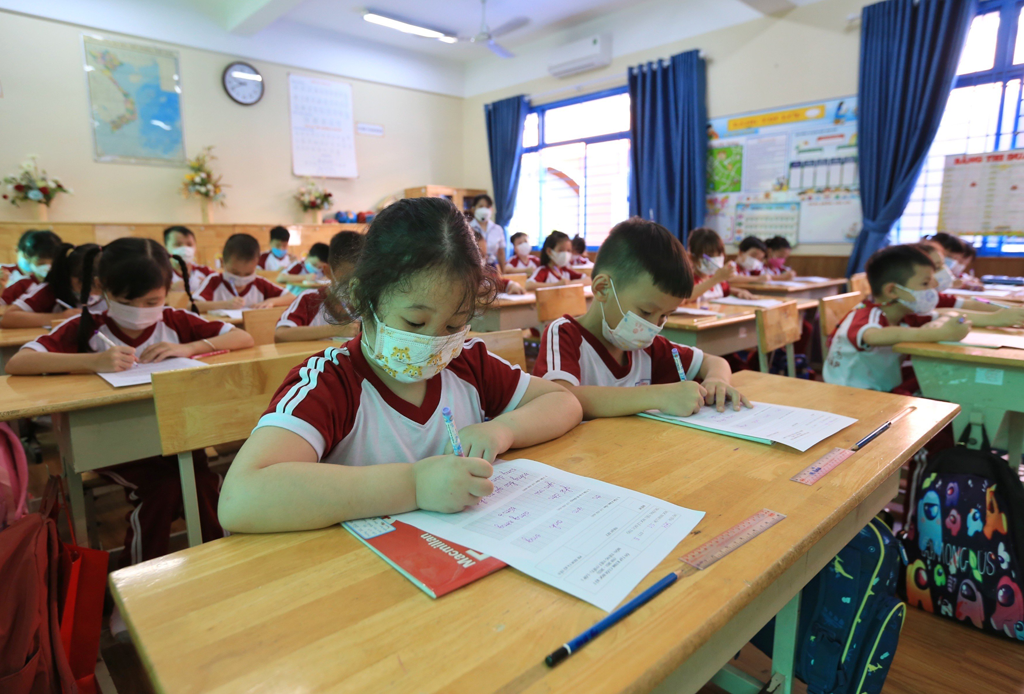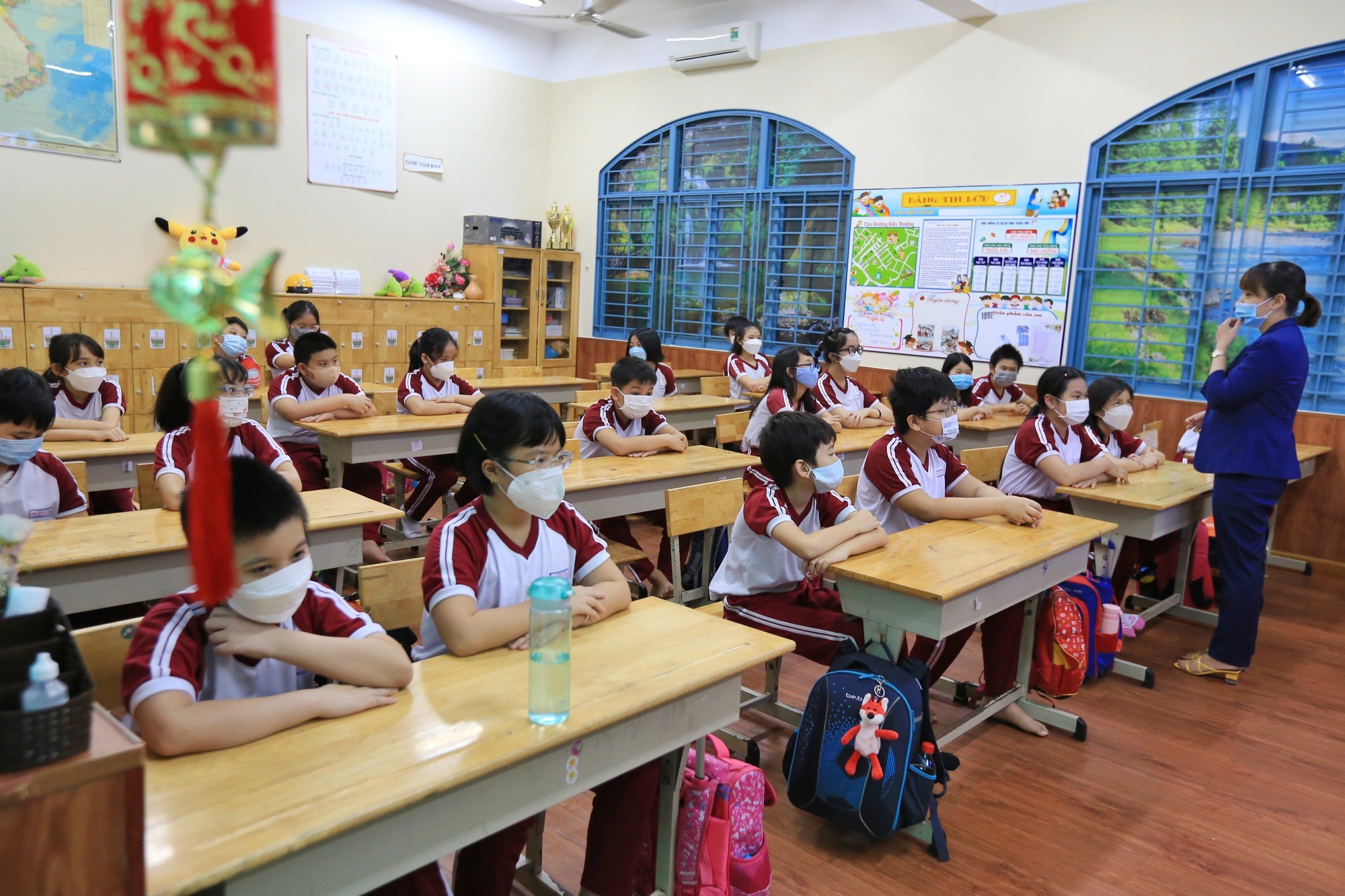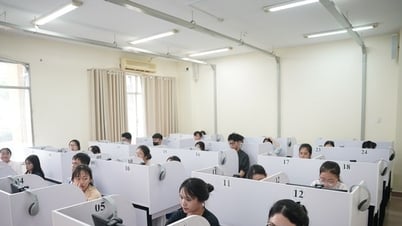
Dr. Thai Van Tai, Director of PrimaryEducation Department (Ministry of Education and Training)
Dr. Thai Van Tai affirmed: Teaching according to the content of the first grade program (mainly teaching writing and calculation) for preschool children, which occurs in some localities, is a pressing issue in society. Teaching before the first grade program is unscientific , causing difficulties in organizing first grade teaching, because it will make children subjective, reduce their interest in learning when entering first grade, and negatively affect the child's psychological development, especially when the teacher has poor pedagogical methods.
BY THE END OF GRADE 1, CHILDREN WILL BE ABLE TO READ AND WRITE FLUENTLY
So what instructions has the Ministry of Education and Training given to rectify this situation, sir?
The Ministry of Education and Training has issued documents such as Circular No. 17 regulating extra teaching and learning; Directive No. 2325/CT-BGDDT on rectifying the situation of teaching and learning before the first grade program of the Minister of Education and Training, which clearly states the requirements for the Department of Education and Training and units under the Ministry.
Regarding the Department of Education and Training, the Ministry of Education and Training continues to request the departments to direct the Departments of Education and Training, primary schools, and preschools in the area to coordinate with local authorities and media agencies to promote propaganda so that parents and society are properly aware of the harmful effects of teaching before the first grade program, not allowing children to study before the first grade program; strictly prohibiting teachers from organizing or participating in teaching before the first grade program.
Direct primary schools to strictly implement the regulations of the first grade program, especially regarding teaching content and knowledge and skills standards; ensure teaching for all students from the first lessons, without skipping any lessons.
The Ministry also requires the Departments of Education and Training to direct the Departments of Education and Training to strengthen the management of preschools, primary schools and extracurricular tutoring facilities, and absolutely not to teach before the first grade curriculum.

The Ministry of Education and Training requires absolutely no teaching in advance of the first grade program.
On the part of the Ministry of Education and Training, when building the new 2018 General Education Program, are there any changes to help children avoid difficulties when entering grade 1 and to make parents feel more secure?
When developing the 2018 General Education Program for primary school, more specifically the Grade 1 program, the authors of the program had to carefully study the 5-year-old preschool education program to create a connection between the two programs, helping children who have finished their preschool program easily access the Grade 1 program without having to go through any transitional courses. In the Primary School Charter, the Ministry of Education and Training also sets out requirements for coordination, handover, and acceptance of students from 5-year-old preschool to Grade 1.
In terms of curriculum, parents can be completely assured because the new general education program is designed to require 2 sessions/day for primary school (the 2006 program requires 1 session/day). Therefore, schools and primary school teachers have more time to help students consolidate to meet the requirements that students need to achieve when completing the first grade program, which is to read fluently and write fluently, helping students have a solid foundation when studying in higher grades.
Furthermore, in the subjects of the first grade program, there are additional experiential activities, helping students have the opportunity to practice and practice Vietnamese to develop language skills. In particular, compared to the 2006 program, the new program has made major adjustments to the Vietnamese subject, increasing from 350 periods/year to 420 periods/year, reducing the duration of some subjects for Vietnamese, with the goal of helping students read and write fluently before moving to higher grades. Because of these changes, I hope parents can rest assured and not rush their children to study before first grade, leading to counterproductive effects as I said above.
Through observation, it is seen that not all students have the opportunity to study preschool programs before entering grade 1. Could you please tell us what instructions the Ministry of Education and Training has so that these students are not disadvantaged?
In the decision on the school year schedule, the Ministry of Education and Training always allows first graders to return to school at least 2 weeks earlier than other classes. The purpose is to help first graders get used to the new learning environment, preparing them mentally for the transition from preschool to primary school.
For students who have not attended preschool at the age of 5, there is currently a project to enhance Vietnamese for preschool children at the age of 5, implemented during the summer to help children who have not attended preschool gain the necessary skills to be ready for grade 1. The Ministry of Education and Training is also developing a program to prepare Vietnamese for children from ethnic minorities and disadvantaged areas before entering grade 1, with a duration of about 80 lessons before the children enter grade 1. The program is expected to be issued next September to ensure that all children have the opportunity to access the grade 1 program more conveniently.

The Ministry of Education and Training always allows first graders to return to school at least 2 weeks earlier than other classes.
TEACHERS DO NOT BLAME STUDENTS FOR ANY MOTIVE
What worries parents is that if they don't let their children study before grade 1, they will get bad grades, be criticized by teachers, and have gaps in knowledge to continue studying in higher classes... So is this worry well-founded?
The Ministry of Education and Training has issued new regulations on testing and evaluating primary school students in general and first graders in particular, in the direction of motivating, encouraging, and recognizing the daily progress of each student. As I said above, the program is designed to study 2 sessions/day, the time increases but the amount of knowledge does not increase. Therefore, teachers have more time to carefully and thoroughly guide how to sit in the correct posture, how to hold a pen, place a notebook, step by step learn to read, write, do calculations, etc., helping students feel confident and enjoy learning activities.
In addition, the Ministry also requires teachers not to compare students or criticize students under any circumstances or for any motive. Primary schools must strictly implement the admission procedures for the first grade according to regulations; absolutely do not organize entrance exams for first grade students.
In big cities, parents are concerned that the number of students in a class is too large, so teachers cannot pay attention to each student; if they do not study in advance, many students will be "left behind". What does the Ministry say about this situation?
In order to effectively implement the 2018 General Education Program towards developing students' capacity, reducing pressure on primary school teachers, especially teachers of grade 1, the Ministry of Education and Training always emphasizes the requirement that the Departments of Education and Training have the responsibility to actively advise the People's Committees of provinces and cities on planning and building preschool and primary education facilities in the locality; gradually overcome the situation of the number of students per class being higher than the regulations in some large cities with high population density, to meet the requirements of improving the quality of education in the area. However, it is impossible to use the reason of large class size to violate the regulations of the industry, force students to study ahead of the program, organize illegal extra classes, etc.
Strictly handle violations of teaching in advance of grade 1 program
The Ministry of Education and Training requires the Departments of Education and Training to advise and coordinate with authorities at all levels and relevant agencies to strengthen inspection, examination and strict handling of educational institutions, organizations and individuals who violate the law. Clearly define the responsibilities of educational management agencies, principals and teachers related to teaching before the first grade program. School principals are responsible for managing, inspecting, strictly and promptly handling according to their authority or requesting competent authorities to handle violations in teaching before the first grade program according to regulations.
The Directive of the Minister of Education and Training also assigned the Inspectorate of the Ministry of Education and Training to preside over the organization of inspections and guide and direct educational inspectors at all levels to conduct inspections, checks, and strictly handle violations of teaching in advance of the first grade curriculum.
Source link


![[Photo] Panorama of the memorial service for former President Tran Duc Luong](https://vphoto.vietnam.vn/thumb/1200x675/vietnam/resource/IMAGE/2025/5/25/d33968481f21434fa9ed0df48b9ecfa9)
![[Photo] President Luong Cuong receives Lao Vice President Pany Yathotou](https://vphoto.vietnam.vn/thumb/1200x675/vietnam/resource/IMAGE/2025/5/25/958c0c66375f48269e277c8e1e7f1545)
![[Photo] Memorial service for former President Tran Duc Luong in Ho Chi Minh City](https://vphoto.vietnam.vn/thumb/1200x675/vietnam/resource/IMAGE/2025/5/25/c3eb4210a5f24b6493780548c00e59a1)
![[Photo] Prime Minister Pham Minh Chinh meets the Vietnamese community in Malaysia](https://vphoto.vietnam.vn/thumb/1200x675/vietnam/resource/IMAGE/2025/5/25/1f11d1256d7745a2a22cc65781f53fdc)

















![[Video] Vietnamese students win first prize in East Asia at global film competition](https://vphoto.vietnam.vn/thumb/402x226/vietnam/resource/IMAGE/2025/5/25/3d525280b49a438793d77319167f53e4)




































































Comment (0)